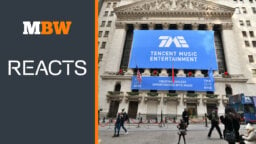Tencent Music Entertainment, the biggest music-streaming company in China, is in trouble. Ever since the company struck a sub-licensing deal with Warner Music Group (WMG) in November 2014 — the first of its kind — it has enjoyed a privileged relationship with the world’s biggest music-rights companies.
That privileged relationship is now facing severe scrutiny. In January, China’s State Administration of Market Regulation launched an investigation into Tencent Music Entertainment, and its current contracts with all three major record companies: WMG, plus Universal Music Group and Sony Music Entertainment.
As part of these contracts, it’s understood, TME not only gains the ability to license the catalogs of these companies for its own platforms (QQ Music, Kugou, and Kuwo), but also to sub-license this material to its rival services, including NetEase Cloud Music and Alibaba‘s Xiami. If TME is found to be unfairly advantaging itself commercially in this situation — “price-gouging” its competitors to an anti-competitive degree — then China’s market regulator could come down on the firm like a ton of bricks.
While this kerfuffle is going on, Tencent — more accurately, TME’s majority owner, the $430 billion-valued Tencent Holdings — appears to be figuring out a more legitimate way to slip into bed with the major labels. Tencent is currently in discussions to buy between 10 and 20 percent of Universal Music Group, in a deal worth approximately $3.3 billion. If this transaction goes through, it will give Universal a valuation of $33 billion-plus, and all three majors combined will be worth, in market terms, more than $85 billion.
The days of Tencent being able to sub-license the majors’ music in China might be over — but the firm’s approach to buying a minority stake in UMG could bring other serious perks, especially for Universal artists. TME’s three services claim a music-streaming market share in China of 83.8 percent, according to Quest Mobile and Macquarie ResearchChina. Should Tencent gain a direct monetary interest in the success of UMG artists, it could quickly accelerate the prospects of non-Chinese stars in the territory. (Blazing a trail, Taylor Swift just showed said non-Chinese stars what they’re currently missing out on: her latest album, Lover, racked up more than a million “equivalent” sales in China by the close of its debut week, a record-breaking performance for an international artist.)
“I’m really excited about the Tencent/Universal deal — it’s an amazing potential intersection not just between two companies that are strategically aligned, but between East and West,” says Jordan Bromley, a music-specialist lawyer at Manatt, Phelps & Phillips LLP, which represents multiplatinum artists and songwriters out of Los Angeles, and takes a keen interest in the development of China’s entertainment industry. “Should this deal go through, I imagine that Universal artists will naturally get preferential treatment [on Tencent services] based on the greater financial reward Tencent will receive when that happens. It looks like a strong synergy strategy.”
Question is, what happens now? My money says Tencent’s long-term strategy is, essentially, to own the international music business in China. And that it will try to do so by accumulating minority stakes in the most powerful music-related companies in the U.S. and Europe. Why minority stakes? Because, handily, they’re far less likely to trigger any anti-competitive watchdogs to swoop.
For one thing, Tencent already owns nine percent of Spotify (while Spotify owns nine percent of Tencent Music Entertainment), thanks to a “stock swap”, scored in 2017. This looks a little like something of a “gentlemen’s agreement,” in which Spotify relinquishes any prior plans to annoy TME by attempting to launch in China. In late 2018, Spotify CFO Barry McCarthy essentially confirmed this, telling media on a closed call, “Our mainland-China strategy is our investment in Tencent Music. We have no plans to compete with them in China.” (Adding complexity to the situation: Universal still owns around 3.5 percent of Spotify, meaning that if Tencent acquired 20 percent of UMG, it would also be buying around 0.7 percent of Spotify as part of the deal.)
If Tencent saw this strategy through, its next natural target after buying a minority share of UMG would be Sony Music Group (owner of Sony Music, the record label, and publisher Sony/ATV) — which is publicly traded via Sony Corp. in Japan — or Warner Music Group, which is 100 percent owned by Len Blavatnik‘s Access Industries. Due to the simplicity of its ownership, Warner may prove the more appealing of the two. Tencent may also peruse the status of the next two biggest companies in global music rights: Berlin-headquartered BMG and London-headquartered Kobalt. Interestingly, Tencent already has a JV label up and running with Sony Music, Liquid State, which launched in early 2018 out of Hong Kong and focuses on dance/electronic artists.
Tencent will know that if it is to acquire further minority stakes in the music business, it might have to work fast. NetEase Cloud Music has just raised $700 million by selling a chunk of its business to Alibaba, one of the richest companies in the world. And the likes of Apple and Google/YouTube — which were both rumoured to be considering a bid to buy a piece of Universal at various points — may feel they need to respond to a Tencent-Spotify-Universal nexus in future by acquiring their own interest in a music-rights company.
Speaking before Alibaba’s investment in NetEase this month, Jordan Bromley told me: “NetEase in particular could respond to Tencent’s [Universal] bid. All these companies — Tencent Music, NetEase Cloud Music, and Alibaba’s [Xiami] — are backed by a huge amount of money. Tencent dominates in music right now, but they are all major players. I could see NetEase attempting some kind of similar arrangement with a music [rights] company in the future.”
He added, “China’s such a huge country, and everything there is shifting toward the music business — copyright law is shifting in [the industry’s] favor, and the data reporting we’re seeing on streams is really improving.
“There’s still a lot to figure out. But with the Tencent deal, Universal is going to be placed right in the center of this amazing market as it all starts to happen. For the artists [that company] works with, that’s a hugely valuable prospect.”






